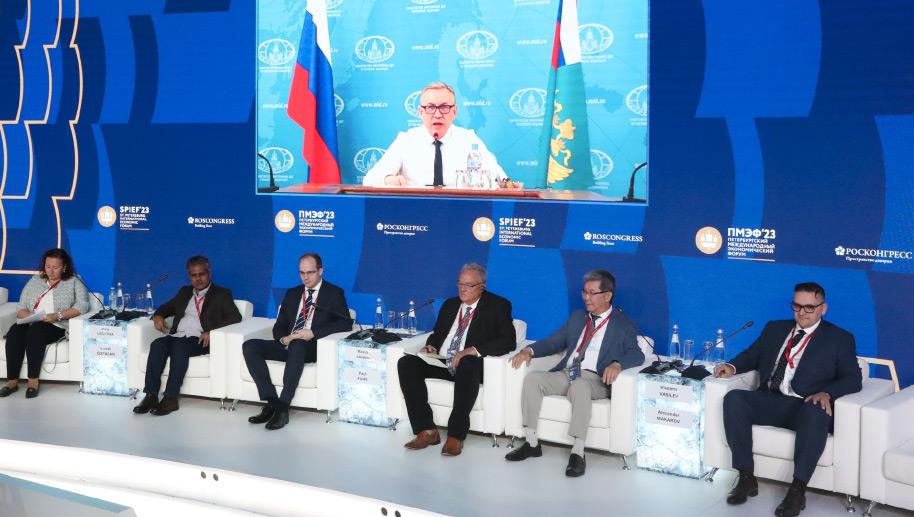
SPIEF Looks at Promising Areas for Cooperation in High Latitudes at the Think Arctic – Think Global Project Session

The emerging areas of Arctic multilateral cooperation in response to global changes were discussed at the session called “The Arctic Region as a Unique Area of International Cooperation: Prospects and Opportunities” under the Think Arctic – Think Global international project held at the St. Petersburg International Economic Forum. This is one of the planned events of Russia’s Chairmanship of the Arctic Council in 2021–2023, the operator of the events being the Roscongress Foundation.
“We see the Arctic gaining increasing prominence on the global agenda as its geopolitical and economic role in the world grows. Interest is being shown not only by the Arctic states but also by ones far from the region. Russia’s high-latitude policy is based on the assumption that there are no Arctic issues or problems requiring a military solution. International rules serve as a solid basis for resolving any regional problems”, said Nikolay Korchunov, Ambassador-at-Large for Arctic Cooperation of the Russian Ministry of Foreign Affairs.
He added that Russia’s priority in the Arctic is the region’s sustainable development, with a constant focus on the interests and needs of all people living there, including the indigenous minorities of the North. Russia is ready to develop a dialogue about the Arctic agenda with all countries, including non-Arctic ones, that share a constructive approach to cooperating in the interests of the Polar Regions.
“We see the BRICS countries becoming an increasingly important factor in world politics on various fronts, giving a good example of how a multipolar world is being shaped. In view of Russia’s forthcoming BRICS chairmanship, we could engage its members in joint work in the Arctic in different formats and areas. The countries of the Persian Gulf and Latin America are also promising partners”, Korchunov noted.
According to Maxim Dankin, Director of the Department for the Development of the Arctic Zone of the Russian Federation and Implementation of Infrastructure Projects at the Russian Ministry of Economic Development, the increased global interest in the Arctic agenda is confirmed by the number of foreign participants in the events within the Russian chairmanship of the Arctic Council, with over 100 representatives of other states having taken part this year alone. After certain Western countries chose not to work closely with Russia on development of the Far North, the Asia-Pacific region, Latin America and the Persian Gulf expressed an interest in cooperating.
“This shows that interest in the Russian Arctic is not waning. Our country is Arctic in many ways: many Russian territories lie beyond the Arctic Circle. For us, it is not only a unique place but also a treasure trove of mineral reserves enabling us to develop our country’s economy. Our priorities remain issues relating to conservation of the unique Arctic nature, sustainable development of the indigenous peoples of the North and international scientific cooperation”, Dankin stated.
The topics of infrastructure development, energy and combating climate change could become major aspects of interstate cooperation in the Arctic, according to Glenn Diesen, Professor at the Department of Business, History and Social Sciences, University of Southeast Norway.
“The Arctic Council has become increasingly hostage to geopolitical confrontation in recent years; suspension of cooperation with Russia through this association was a big mistake, simply because Russia occupies half of the Arctic; and institutions for international cooperation in the Arctic are soon likely to undergo changes: the fact that the Arctic is becoming an area of interest not only to Western countries and Russia but also to states in other regions must reflect this process. He went on to say that, if we want to secure sustainable development in the Arctic region, we need more inclusive formats for multilateral engagement in the region,” Diesen believes.
The session “The Arctic Region as a Unique Area of International Cooperation: Prospects and Opportunities” is the last in the series of events held within the Think Arctic – Think Global project. The results of the session will feed into an analytical report on international cooperation on sustainable development between Russia, on the one hand, and Arctic and non-Arctic states, on the other. It will be prepared as part of the Think Arctic – Think Global project, which is being implemented jointly by the Roscongress Foundation and the Centre for Comprehensive European and International Studies at the National Research University Higher School of Economics. The discussion will be moderated by Anastasia Likhacheva, Dean of the Faculty of World Economy and World Politics at the National Research University Higher School of Economics.
The Think Arctic – Think Global project aims to promote Russia’s sustainable development agenda, strengthen constructive international dialogue and offer new points of convergence for Russia’s cooperation at high latitudes with all interested countries and organisations.
The session “The Arctic Region as a Unique Area of International Cooperation: Prospects and Opportunities” was held at the stand of the Russian Ministry for the Development of the Far East and the Arctic during the SPIEF. The stand’s business programme includes around 15 events, some of which will be held as part of Russia’s Chairmanship of the Arctic Council. These include discussions called “The Northern Sea Route. Outcomes and Plans”, “Protecting and Monitoring Arctic Biodiversity”, “The Russian Arctic – Focal point. Protected Areas in the 21st Century” and “Film-Making in the Arctic: Dialogue Between Nature and Technology.”